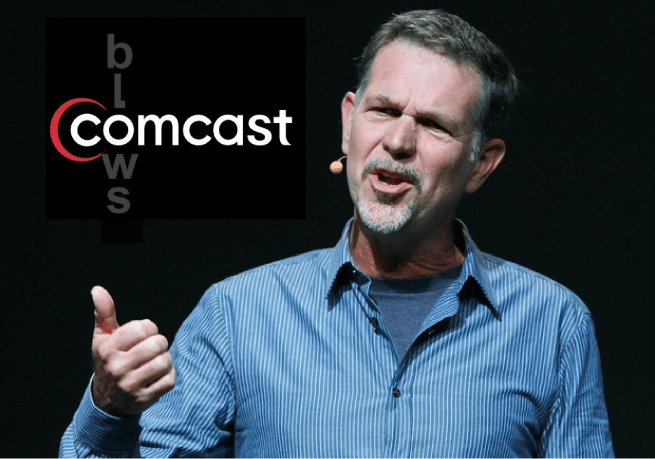It’s been an impressive year for cable giant Comcast. The company is now valued at $135 billion, almost 43 percent higher than it was a year ago — a growth that will leave every other major American company pretty envious.
But Comcast’s positioning in the Internet ecosystem has gotten so powerful, some industry watchers fear, that it could create inequalities in how web publishers are able to deliver their content, and in how regular Internet users are able to consume it.
And recent comments by FCC Chairman Tom Wheeler about “net neutrality” have bolstered these concerns.
At stake is the principle of net neutrality, which is the understanding that Internet service providers should treat all data on the Internet equally. Accordingly, large Internet companies should not have the right to pay to have their data prioritized over other providers as it passes through the Internet to consumers. This would be unfair to smaller companies that can’t afford to pay such a super-highway tax.
The principle has been upheld in recent years, but precariously, as court decisions have challenged it, and large and growing companies like Comcast and Verizon find their interests constrained by it.
That’s why remarks made by the new FCC Chairman Wheeler earlier this month at Ohio State University got so many observers concerned. During a question and answer period following his prepared remarks, Wheeler signaled a readiness to consider a situation where some content providers, such as Netflix, may pay for the right to transmit content across the Internet more reliably:
“I think we’re also going to see a two-sided market where Netflix might say, ‘Well, I’ll pay in order to make sure that you receive, my subscriber receives, the best possible transmission of this movie.’ I think we want to let those kinds of things evolve. We want to observe what happens from that, and we want to make decisions accordingly, but I go back to the fact that the marketplace is where these decisions ought to be made, and the functionality of a competitive marketplace dictates the degree of regulation.”
But a few days later, Wheeler clarified his remarks in front of a House Energy and Commerce Committee hearing, explaining he stands behind the FCC’s Open Internet Rules, passed in 2010 to implement agency regulations upholding net neutrality. He said he is a “strong supporter of the Open Internet Rules, full stop.” That was reassuring.
So what’s the big deal? Well, as some people have noted, Wheeler prepared those spoken remarks before the House, and his more free-wheeling comments made during the Ohio presentation may be more representative of his personal views. What’s more, he was a paid lobbyist for years in Washington, representing the cable and telecom industries and has been a Washington insider ever since. The large cable and telecom companies can articulate their interests in a clear and targeted way inside the beltway, perhaps even in a way that wider consumer interests cannot be articulated. “To some extent, you are your resume,” wrote the New Yorker in a feature about Wheeler.
Concerned observers will be watching closely how Wheeler confronts the issue next year when the Open Internet Rules are challenged once again in the D.C. Court of Appeals. They fear Comcast’s power, in particular, given its “terminating access monopoly,” or control over access to the Comcast customer. A good piece outlining the concerns was just published by the New America Foundation. Already, several fees and payments are being made by companies like Netflix to get its content to consumers through Comcast to end users. For example, Netflix pays Level 3, a content delivery network (CDN), to transport its video data through the Internet in order to get to Comcast customers. And in 2010, when Level 3 informed Comcast that it would need more interconnection capacity with Comcast to deliver the streaming content, Comcast forced Level 3 to pay for that access. This is all happening even with Open Internet Rules in place.
Finally, Comcast has recently purchased NBC Universal, so it owns a large amount of content flowing over the pipes it owns — so it has a big incentive to make it more difficult or more expensive for CDNs and companies like Netflix to transport over its network.
And Comcast’s tension with Netflix has only worsened. While Comcast was a big stock gainer this year among big companies, Netflix did even better. It was the best performer on the S&P this year, a beneficiary of renewed attention to its speedy offering and wide-ranging content. Netflix’s original programming successes — shows like “Orange is the new Black” and “House of Cards” — have become the most compelling reasons yet for consumers to consider cutting the cord and ditching their cable service, such as Comcast’s.
So Comcast has more reason than ever to try to find ways to push back against net neutrality in 2014. And that’s not to say that Netflix wouldn’t like to cut a deal with Comcast, to pay for the right to prioritize its content, thus degrading other content. Indeed, the complexity of Internet interests makes it hard sometimes to fully understand at what point competitors can turn into frenemies. It’s the consumer who is most likely to be harmed by a setback to net neutrality. With so much at stake, be sure that if Wheeler budges even an iota from his declared support of the Open Internet, you’ll hear about it.









